Review: Taylor Mac's The Hang Is a Radical Cry for Gaiety in an Oppressively Serious World
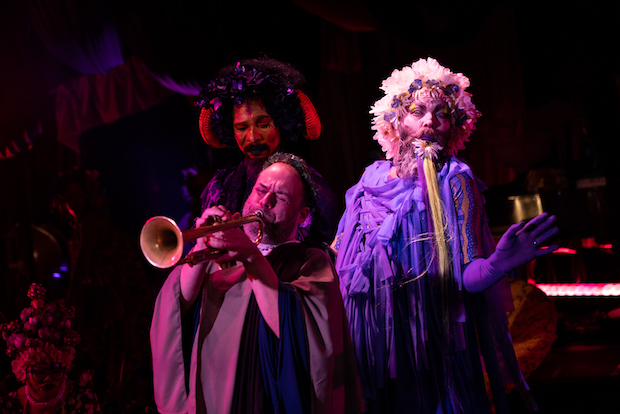
(© Maria Baranova)
Taylor Mac gave me my first of many regrets during the Covid era. The singer-songwriter and genius playwright was presenting the world premiere The Fre at the Flea Theater, featuring the now-defunct house company, the Bats. I was scheduled to see it Friday, March 13 (it still appears in my phone's calendar). But since Covid was new and scary and had caused Broadway to shutter the day before, I was naturally wary of jumping into the ball pit with a bunch of strangers — so I canceled. Little did I know I was bailing on what would have been my last in-person performance for over a year. In retrospect, I really wish I hadn't.
And so it is with extreme gratitude that I now report that my first truly great night at the theater following the return of in-person performances was at Mac's The Hang, now delighting and astounding audiences at HERE. Originally part of the Prototype Festival of experimental opera (which was canceled in the wake of the Omicron surge) The Hang depicts the final hours in the life of Socrates through 100 minutes of operatic jazz. Mac wrote the book and lyrics (and stars as Socrates), while the music is by Matt Ray, Mac's collaborator on the epic 24-Decade History of Popular Music. From the moment percussionist Joel Mateo strikes up a cymbal roll, The Hang grabs hold of your imagination and doesn't let go.
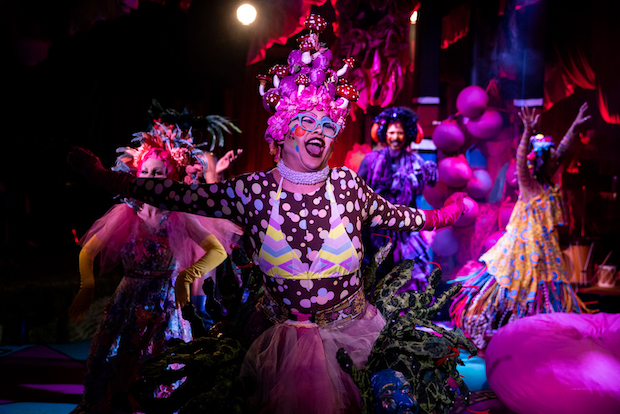
(© Maria Baranova)
A huge part of that is the fantastical scenic and costume design of Machine Dazzle, who delivers looks rarely seen off the runway or outside of a Dr. Seuss book (Trebien Pollard's satyr costume is especially striking, augmenting the performer's natural intensity). Except for the uptight Plato (Ryan Chittaphong), who spends much of the evening at the side of the stage recording everything on his scroll typewriter, this is a very queer group of Athenians for whom plain white togas just won't cut it.
These disciples of Socrates are ostensibly gathered to witness the state execution of their friend and mentor, but it very quickly turns into a party for drinking and wondering (a favorite pastime of Socrates). He asks them to spend his final hours musing on virtue, and they do not disappoint.
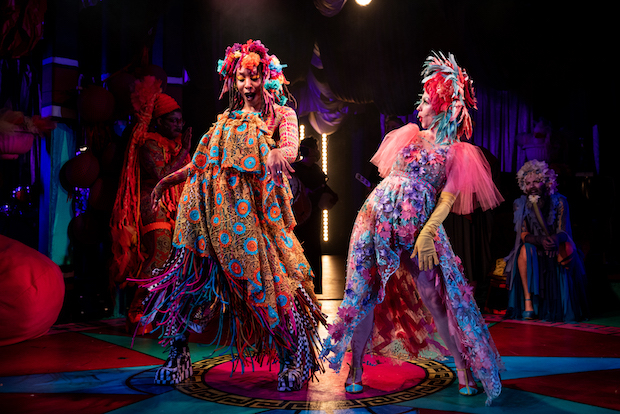
(© Maria Baranova)
Kat Edmonson and Synead Cidney Nichols give expressive voice to "What do you mean by virtue?", a classically Socratic question set to a danceable groove (saxophonist Jessica Lurie really shines in this number). Armed with hand fans (a drag queen's weapon of choice) Wesley Garlington sings about being "a gadfly hov'ring in the corner of an eye." While seated on the toilet under a chandelier that looks suspiciously like a crystal Covid particle, Queen Esther sings, "Is virtue only found in things that last? / If so then you and I don't stand a chance." She defends Aristophanes to Plato, who think that his comedy, The Clouds, turned the Athenian mob against his mentor. She counters that art and culture are blameless when it comes to actual violence — a position Socrates seems to share.
Standing on a cheeky pedestal, an apparent mockery of more serious portrayals of the Athenian teacher who always rejected that title, Socrates sings that he wants to "debunk
the verdict that a thought will trick or kill you," which seems like a forbidden notion itself in our age of pearl-clutching over "misinformation." Mac portrays Socrates with the wide, expressive eyes of a child seeing the world for the first time. A habitual grin conveys genuine delighted in mystery, even on the eve of his own death.
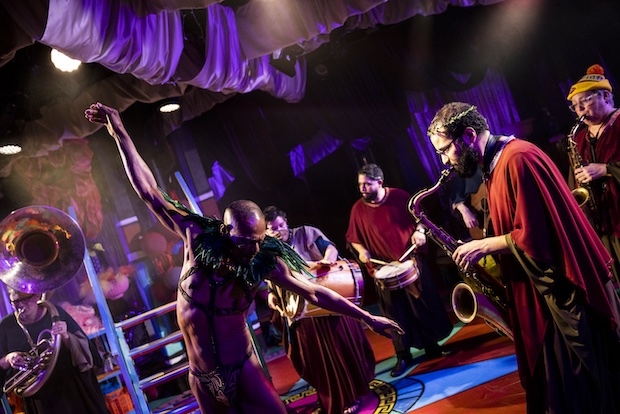
(© Maria Baranova)
Director Niegel Smith (artistic director of the Flea, who also helmed The Fre) leads a production that overflows with exuberant whimsy. Chanon Judson's choreography wouldn't feel out of place in a 1960s variety show (the riotous "Okay Boomer" is especially fun), while Dazzle's swanky, fuzzy set pieces are constantly unfolding and surprising. Kate McGee lights everything with Vegas showmanship, and Cricket S. Myers engineers a sound balance that makes every lyric perfectly audible, a real accomplishment when the band keeps moving.
Ray's music puts top-notch jazz in an operatic form, all presented in the intimacy of an off-off-Broadway venue. The expert musicians are essential to Smith's staging, with a wandering saxophone section (Jonathan Beshay, Lisa Parrott, and Jessica Lurie) regularly crossing the stage. J. Walter Hawkes joins the symposium with some of the most expressive trombone playing I've ever heard, and trumpeter Greg Glassman wails the house down. It all feels like being invited to a secret party in a city ruled by killjoys — which is something we New Yorkers might relate to these days.
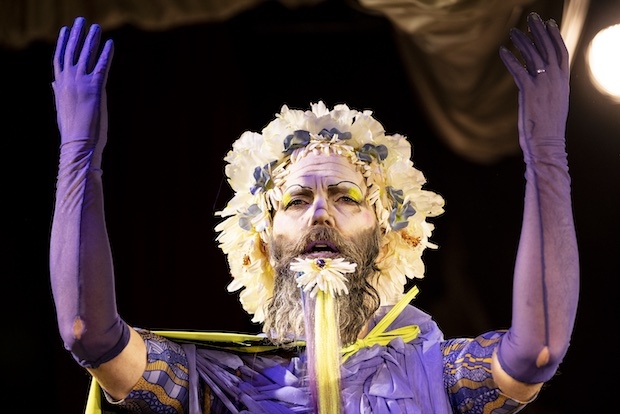
(© Maria Baranova)
Mac is acutely aware of how yesterday's counterculture, when run through Washington consultancies and Madison Avenue boardrooms, can calcify into today's stifling conformity. In such a situation, what can a free spirit do but fabulously resist? In the song "The Poison," Socrates warns, "Beware the commerce of your outrage: / the act of courage on the stage /
of streets and phones and socials we all soak in." In a country shaped by ministers damning sinners from the pulpit, we would do well to recognize that they don't all wear pilgrim costumes anymore.
The most daring aspect of The Hang is also its most heartening: About a man's death from hemlock poisoning, it is unfailingly joyous, and never takes itself too seriously. It is a radical declaration of queer frivolity in our severe age, and it restores my faith that there is still room for dangerous ideas and weird people in the New York theater.










